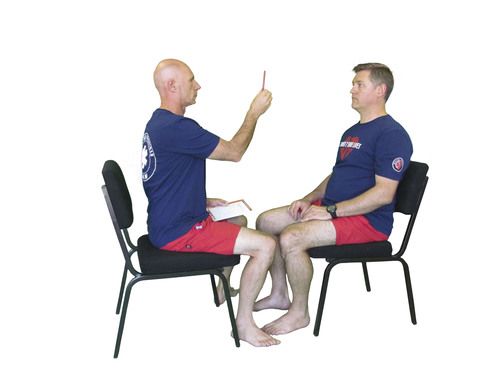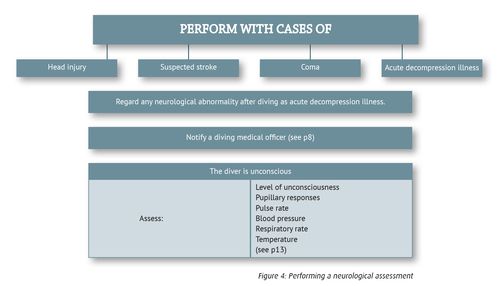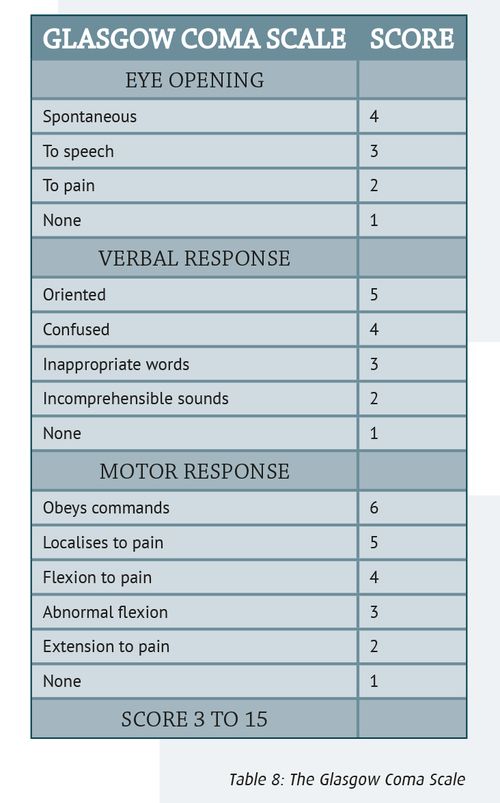How to perform a Neurological Assessment

The skill to perform a Neurological Assessment can be life saving when a victim is suspected of having suffered a stroke, have a head injury , is in a coma or when the diver is suspected of having acute decompression illness.
It is good practice to regard any neurological abnormality after diving as acute decompression illness. Notify a diving medical officer , cal DAN Hotline +27 82 810 6010
It is good practice to regard any neurological abnormality after diving as acute decompression illness. Notify a diving medical officer , cal DAN Hotline +27 82 810 6010

With an unconscious diver
Assess:
Use the Glasgow Coma Scale to assess the level of consciousness.
Assess:
- Level of unconsciousness
- Pupillary responses
- Pulse rate
- Blood pressure
- Respiratory rate
- Temperature
Use the Glasgow Coma Scale to assess the level of consciousness.
- A fully conscious victim will score 15 points.
- A deeply unconscious victim will score three points.
- Assess the victim's pain responses by firmly squeezing his or her Achilles tendon between your thumb and forefinger for two seconds.
- A painful stimulus normally causes limb withdrawal from the source of pain as the knee and hip joints flex. This is called a flexion response. If the limb is thrust straight out following a painful stimulus, it is an abnormal “extension to pain” response.
- All responses must be noted as indicated below.

Repeat all these observations every 15 minutes while consciousness is reduced or confusion and disorientation are present. When the victim is fully conscious, repeat these observations at hourly intervals. Pinpoint or unequal pupil size, slowing of the pulse and respiratory
rate, and an increase in blood pressure indicate increased pressure on the brain.
Instruments required
rate, and an increase in blood pressure indicate increased pressure on the brain.
Instruments required
- Light source
- Patellar hammer
- Cotton wool ball
- Pin
- Blunt-pointed object
- Sphygmomanometer to measure blood pressure
- Rectal thermometer
- Timing device
- Tuning fork
Posted in Dive Safety Tips, Smart Guides, First Aid Training
Posted in Basic Life Support, CPR, Neurological assessments, First Aid Training
Posted in Basic Life Support, CPR, Neurological assessments, First Aid Training
Categories
2025
2024
February
March
April
May
October
My name is Rosanne… DAN was there for me?My name is Pam… DAN was there for me?My name is Nadia… DAN was there for me?My name is Morgan… DAN was there for me?My name is Mark… DAN was there for me?My name is Julika… DAN was there for me?My name is James Lewis… DAN was there for me?My name is Jack… DAN was there for me?My name is Mrs. Du Toit… DAN was there for me?My name is Sean… DAN was there for me?My name is Clayton… DAN was there for me?My name is Claire… DAN was there for me?My name is Lauren… DAN was there for me?My name is Amos… DAN was there for me?My name is Kelly… DAN was there for me?Get to Know DAN Instructor: Mauro JijeGet to know DAN Instructor: Sinda da GraçaGet to know DAN Instructor: JP BarnardGet to know DAN instructor: Gregory DriesselGet to know DAN instructor Trainer: Christo van JaarsveldGet to Know DAN Instructor: Beto Vambiane
November
Get to know DAN Instructor: Dylan BowlesGet to know DAN instructor: Ryan CapazorioGet to know DAN Instructor: Tyrone LubbeGet to know DAN Instructor: Caitlyn MonahanScience Saves SharksSafety AngelsDiving Anilao with Adam SokolskiUnderstanding Dive Equipment RegulationsDiving With A PFOUnderwater NavigationFinding My PassionDiving Deep with DSLRDebunking Freediving MythsImmersion Pulmonary OedemaSwimmer's EarMEMBER PROFILE: RAY DALIOAdventure Auntie: Yvette OosthuizenClean Our OceansWhat to Look for in a Dive Boat
2023
January
March
Terrific Freedive ModeKaboom!....The Big Oxygen Safety IssueScuba Nudi ClothingThe Benefits of Being BaldDive into Freedive InstructionCape Marine Research and Diver DevelopmentThe Inhaca Ocean Alliance.“LIGHTS, Film, Action!”Demo DiversSpecial Forces DiverWhat Dive Computers Don\'t Know | PART 2Toughing It Out Is Dangerous
April
